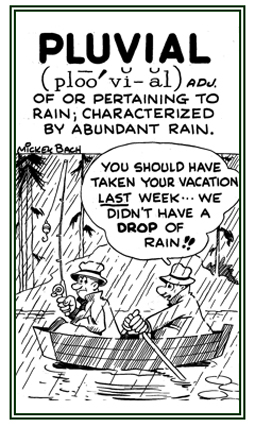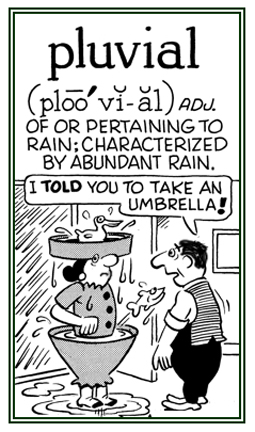pluv-, pluvio-, pluvi-
(Latin: rain, raining, rain water, rainy; rain fall; heavy showers)
An open space over the atrium of a Roman house through which the rain flew into the impluvium or cistern (Roman antiquity): The little girl sat down on a bench in the garden of her home in Rome looking up at the stars through the compluvium, dreaming of her future husband.
A rainwater tank in the atrium of an ancient Roman house: The household maid was told to get water from the impluvium in the middle of the garden for her mistress.
A line on a chart drawn through geographical points having the same rain or precipitation: Gerhard studied the isopluvials on the map, preparing his geography lesson about rainfall in central and southern Europe.
Jupiter Pluvius (s) (proper noun) (no plural)
The supreme god of the Romans: Jupiter Pluvius was, among other things, the Rain god.
Jupiter was also said to be the god of the sky and lightning.
pluvial (adjective), more pluvial, most pluvial
1. A descriptive term for an abundance of precipitation or heavy rain: Why is it that some parts of the country have more pluvial conditions, even with floods; while other sections are suffering from drought or not even any light rain for weeks or months?
2. Etymology: from French pluvial (12c.), "pertaining to rain"; from Latin pluvialis, "a reference to rain, rainy, rain-bringing"; from pluvia, "rain (water)"; from pluvius, "rainy"; and from plovere, "to rain".

© ALL rights are reserved.

© ALL rights are reserved.
Go to this Word A Day Revisited Index
2. Etymology: from French pluvial (12c.), "pertaining to rain"; from Latin pluvialis, "a reference to rain, rainy, rain-bringing"; from pluvia, "rain (water)"; from pluvius, "rainy"; and from plovere, "to rain".


Go to this Word A Day Revisited Index
so you can see more of Mickey Bach's cartoons.
Heavy and prolonged precipitation during the Ice Age in a normally dry or semi-arid area of land with little evaporation: In her biology class at school, Linda learned that the extreme rainfall during the Pleistocene epoch was known as the pluvial period, which caused an expansion of vegetation and created lakes: for example, Lake Lahonta in Nevada, USA, and Lake Bonneville in Utah, USA.
A person or people who have a feeling of impending danger regarding downpours of rain: There were many pluvialphobes who were justified in being very concerned about the forecasts that more cloudbursts were coming which would intensify the flooding that had already destroyed so many homes, crops, and lives during the last two weeks of overwhelming deluges.
pluvialphobous (adjective), more pluvialphobous, most pluvialphobous
1. A reference to an abnormal fear of rain or of being rained on: Susan had a pluvialphobous reaction when she saw that it was drizzling outside and so she decided not to go out at all, dreading to get wet.
2. Pertaining to herbs and other living species that cannot survive with excessive rains: Robert loved his cacti and since he knew them to be pluvialphbous plants, he didn’t water them very often.
2. Pertaining to herbs and other living species that cannot survive with excessive rains: Robert loved his cacti and since he knew them to be pluvialphbous plants, he didn’t water them very often.
pluviofluvial (adjective), more pluviofluvial, most pluviofluvial
Referring to the combined action or results of rainfall and the flow of streams or rivers: There was a sudden cloudburst causing a deluge of water which resulted in a pluviofluvial overflowing of the creek in the village.
1. A self-registering rain gauge: Because little Timmy was so interested in measuring things and keeping the data, his parents gave him a pluviograph, not only to keep track of how much it rained during the day, but also to save the information over a period of time.
2. A branch of meteorology dealing with the automatic registration of the precipitation of rain, snow, etc.: The official weather reporters for radio and TV stations; as well as, for newspapers, rely on pluviographs for their information and weather forecasts in order to tell and to show the viewers if there will be downpours or just drizzles on specific days.
2. A branch of meteorology dealing with the automatic registration of the precipitation of rain, snow, etc.: The official weather reporters for radio and TV stations; as well as, for newspapers, rely on pluviographs for their information and weather forecasts in order to tell and to show the viewers if there will be downpours or just drizzles on specific days.
pluviographic (adjective), more pluviographic, most pluviographic
Descriptive of the precipitation of rain, snow, etc.; and the presentation of such data: The current pluviographic measurements shown on the TV weather broadcast didn’t match up with the torrent of rain Jack and Susan were watching outside through their living room window!
pluviographical (adjective), more pluviographical, most pluviographical
Relating to the descriptions of showers, snowfall, etc. and their recorded data: Linda and the other biology students had to collect pluviographical statistics every day for six months for their report on the weather conditions in their home town.
The division of meteorology concerned with the mechanical tabulation of sleet, hail, etc. and the details involving them: After learning a great deal about weather in his biology class at school and what caused the extreme weather changes, Tom decided to do his internship in pluviography before beginning his studies in geography at the university.
An instrument that measures rainfall which is also known as a rain gauge: The Hillman family in California used to have a pluviometer attached to a post in their backyard which measured the amount of precipitation whenever there was any.
pluviometric (adjective), more pluviometric, most pluviometric
Referring to a device which assesses the amount of condensation in the atmosphere: The pluviometric results of snow that Cindy wrote down for her meteorolology class matched up significantly with those that the weather forecaster presented on TV for that day.

